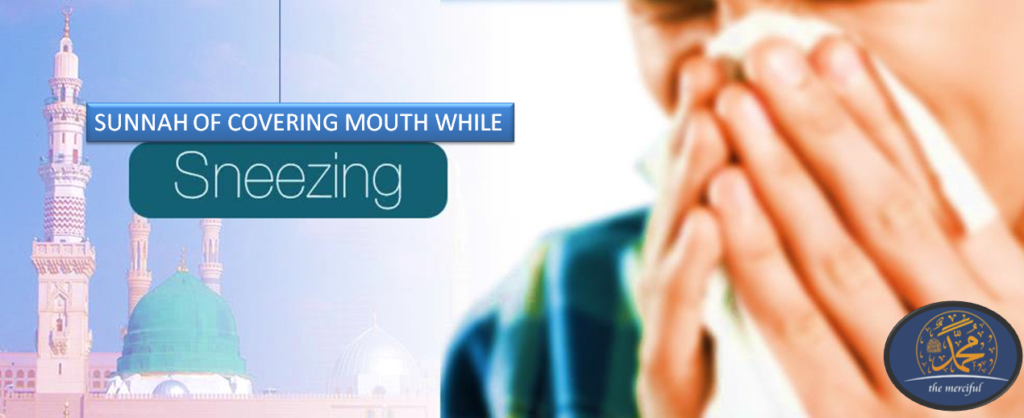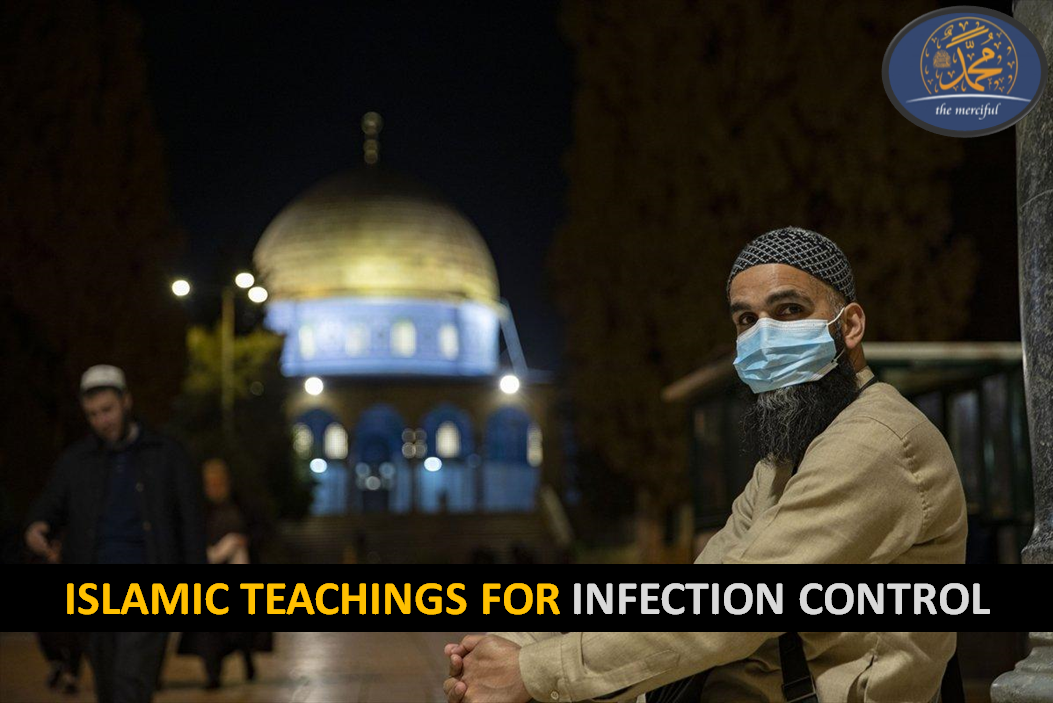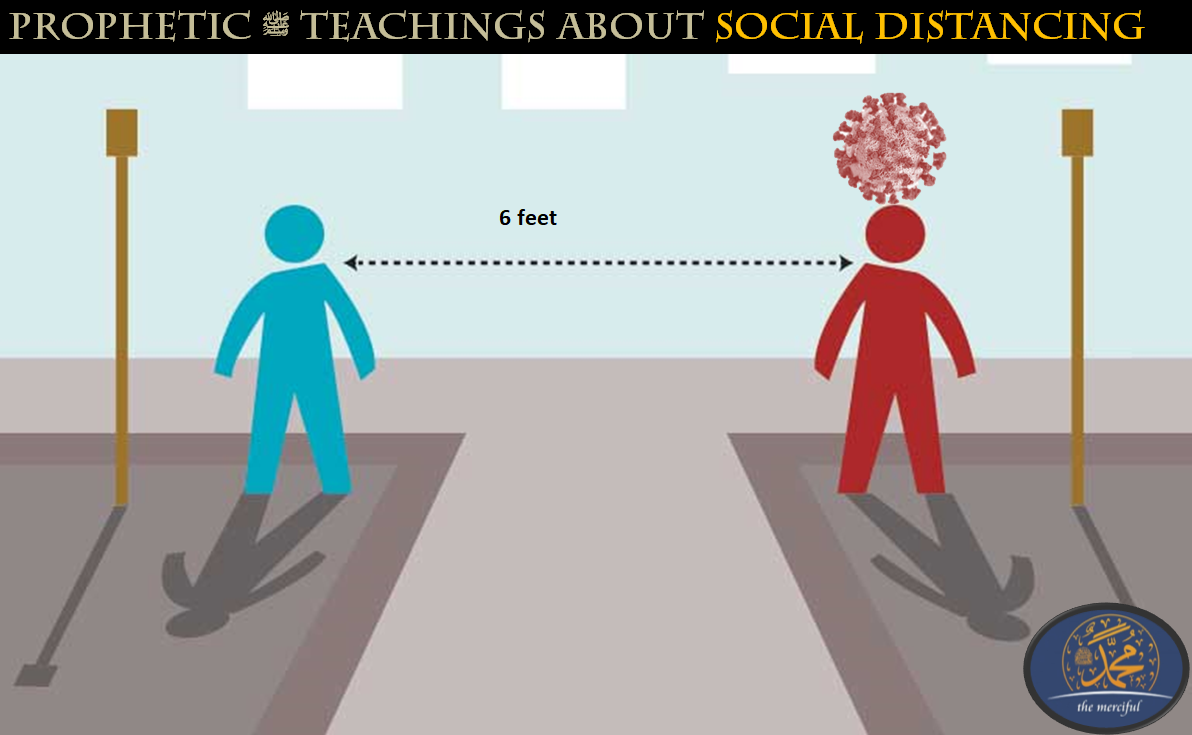Infection control in Islam
We should keep in mind that plagues, wars, and natural disasters have afflicted our species throughout human history and that these will remain a part of life on earth. In fact, epidemics are mentioned at least twice in the Qur’an—in the second chapter, Al-Baqarah (The Cow), and in the seventh chapter, Al-Arāf (The Heights).
We are living in a time , when COVID-19 has affected the whole world and has been declared a pandemic by the World Health Organization. In this time of severe health crisis,Muslims are duty-bound to act upon the instructions and precautions being prescribed by the national and international bodies to prevent the spread of this pandemic. It is high time the teachings and guidance derived from the Holy Qur’an and Sunna are conveyed as humanity grapples with one of the worst catastrophes.
Our sacred law holds preservation of life among the highest of divine objectives and has given us guidance on how to prevent spread of communicable diseases.More than 1400 years ago, Prophet Muhammad(peace be upon him), was teaching his followers hygiene practices that are still applicable in the 21st century.From the traditions of Prophet Muhammad(peace be upon him), we find evidence that clearly indicates Islam’s stance on coughing and sneezing openly. Prophet Muhammad(peace be upon him) instructed the believers to cover their faces when sneezing.[Mustadrak,Hakim] The most obvious effect of sneezing and coughing without covering the mouth is the spread of airborne bacteria and viruses, in addition, droplets invisible to the naked eye, may fall onto surfaces or other people.According to the Centre for Disease Control in the USA, the viruses that cause SARS/COVID-19 are thought to be transmitted most readily by respiratory droplets produced when an infected person coughs or sneezes.

Some more Prophetic traditions regarding Quarantine and isolation to prevent spreading of infection/epidemic are being stated here:
Prohibition to leave the area of Epidemic
On the authority of Hadrat Usamah b. Zayd(RA), the Messenger of Allah(peace be upon him) said, “If you hear of an epidemic afflicting a land, do not enter it, and if it afflicts the land you are in, do not leave it”►(Sahih Bukhari).
One of the reasons that an infected person is prohibited from leaving the area of the epidemic is so that such a person does not transmit the illness to others. Instead, he should quarantine himself from even the healthy people of that region. 

Plague during the Reign of Caliph Umar(RA)
Hadrat ‘Abdullah ibn ‘Abdullah ibn al-Harith ibn Nawfal(RA) reported from ‘Abdullah ibn ‘Abbas(RA) that Hadrat ‘Umar ibn al-Khattab(RA) set out for Syria. When he got as far as Sargh, he met the commanders of the army commanders, Abu ‘Ubayda ibn al-Jarrah(RA) and his companions, told him that the plague had broken out in Syria.
Hadrat Ibn ‘Abbas(RA) said, “‘Umar said to me, ‘Call the early Muhajirun for me,’ and so I called them and he consulted them and informed them that the plague had broken out in Syria. They disagreed.
Some of them said, ‘You have set out on a matter and we do not think that you should retreat from it.’
Others said, ‘With you are the rest of the people and the Companions of the Messenger of Allah, may Allah bless him and grant him peace, and we do not think that you should expose them to this plague.’
He said, ‘Leave me.’
Then he said, ‘Call the Ansar for me,’ and I called them and he consulted them. They behaved as the Muhajirun had done and disagreed as they had disagreed.
He said, ‘Leave me.’
Then he said, ‘Call for me those who are here of the elders of Quraysh who emigrated before the Conquest of Makka.’
So I called them, and there were not two of them who disagreed about it.They said, ‘We think that you should return with the people and not expose them to this plague.’
So Hadrat ‘Umar(RA) made an announcement among the people: ‘I am travelling back in the morning, so travel back then as well.’
Hadrat Abu ‘Ubayda ibn al-Jarrah(RA) said, ‘Are you fleeing from the decree of Allah?’ Hadrat ‘Umar(RA) said, ‘If only someone other than you had said that, Abu ‘Ubayda!’ Yes, we are fleeing from the decree of Allah to the decree of Allah. Do you think that if you had camels and they went down into a valley which had two sides, one of which was fertile and the other barren, and you grazed them on the fertile side, that that grazing would be by the decree of Allah, and if you grazed them on the barren side, that that grazing would not be by the decree of Allah?'” Hadrat ‘Abdu’r-Rahman ibn ‘Awf(RA), who had been absent on some errand, then came and said, ‘I have some knowledge of this. I heard the Messenger of Allah, may Allah bless him and grant him peace, say, “When you hear that it is in a land, do not go to it. When it comes to a land where you are, do not leave it, fleeing from it.’”
Hadrat ‘Umar(RA) praised Allah and then left.”►{Sahih Bukhari,What is mentioned about the plague,Hadith #5397}
Ibn Athir (d. 630/1233) mentions in his Al-Kamil fi al-tarikh (The Complete History), “Hadrat Amr b. al-Aas(RA) fled Emmaus with the people when they were afflicted with the plague and went up into the mountains until Allah removed it from them. News of this reached Hadrat Umar b. al-Khattab(RA), and he did not censure it [meaning, as caliph, he deemed Amr’s actions as appropriate and hence sanctioned by him].”
Observing Distance from patient suffering from Leprosy
Leprosy is a communicable disease, and the reason for the prophetic command to flee from it is so that its transmission can be stopped. This is a proof that we believe that diseases do transmit to others by God’s leave and that one should distance oneself from their sources.
On the authority of Abu Hurayrah(Radiyallahu Anhu), the Messenger of God(peace be upon him) said, “Flee from leprosy (judham) as you flee from a lion!”►(Sahih Bukhari).

Prohibition to introduce infectious livestock(farm animals) into a Healthy Herd
On the authority of Abu Hurayrah(Radiyallahu Anhu), the Messenger of Allah(peace be upon him) said, “Do not introduce infectious livestock into a healthy herd” ►(Sahih Bukhari).
Prophet Muhammad(peace be upon him) instructed that even infectious animals should be isolated from healthy ones in order to prevent the spread of diseases among the healthy animals.
Note :- Unfortunately some Muslims believe that there is no such thing as a contagious disease due to their misunderstanding of certain ahadith. To be clear the meaning of these ahadith is not that a person can’t catch an illness from someone else. Rather they are pointing to the reality that nothing has power to do anything independently of Allah’s Power. In other ahadith there is clear advice not to leave areas in which diseases are spreading or to enter such areas and also some traditions have guidance to quarantine patients having communicable diseases. Taken together we are being taught to take both spiritual and medical precautions in relation to communicable diseases and put our trust in Allah.



